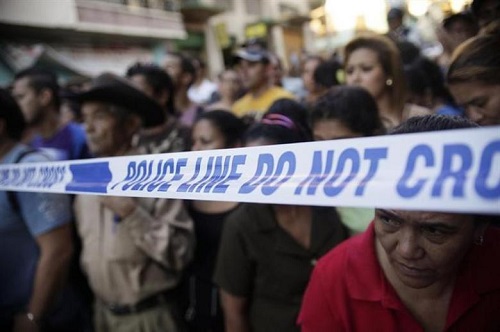Reuters photo
By
Ricardo Swire
Caribbean internal security intelligence officials closely monitor the Northern Triangle of El Salvador, Guatemala and Honduras’ runaway violence and organized crime. The alias “Northern Triangle” was given to the tri-state region in 2001 after creating the commercial alliance in the form of a Free Trade Agreement with Mexico. A March 2012 gang truce in El Salvador halved that country’s daily murder rate. In the last three years 48,947 Northern Triangle residents were murdered. Crimes against domestic commerce, especially highway freighting robberies, have increased.
Criminal syndicates based in the interlocking territories regard transiting commercial shipments and extortion of regional transportation businesses as extra revenues. Such internal security vulnerability hits deep in local entrepreneurs’ pockets, as stolen merchandise reflects dollar and cents. Cargo hijackings cost the individual economies as much as US$5 million monthly losses. Freighting companies are compelled to pay more for extra security such as GPS monitoring systems. Private security escort cost from US$100 to US$1500 per trip.
Over a six year period 67 Nicaraguan truck drivers were murdered during highway robberies. Mainly bus owners are targeted by gangs as easy extortion possibilities in the Northern Triangle. Bus owners pay mandatory “War Tax” where designated bus routes cross gang zones. A 2015 National Civil Police of El Salvador report registered 93 bus and mini-bus drivers murdered that year. In January 2016 a Salvadorian Route 16 transportation worker was the seventh person killed in a gang enforced bus strike. Local criminal syndicates extorted US$26 million from transportation companies.
America’s DEA designated MS-13 a global criminal syndicate, equal to Los Zetas in Mexico and the Yakuza in Japan. In April 2016 the gang’s leaders ordered approximately 40,000 members, in 49 national “programs” or sections, to submit all cash earned in one week totaling US$600,852. On Wednesday July 27. 2016 “Operation Check” mobilized 1,127 Salvadorian law enforcers. Officers raided car dealerships, bars, brothels and motels fronting for MS-13, several busses and cars seized.
Guatemalan law enforcement has evidence regarding the robbery of a truck transporting school supplies from Mexico to Nicaragua. December 2016 police data catalogued how gunmen hijacked the container truck along the Chiquimula or Santa Rosa road leading to El Salvador. Patterns show that extortion payments are mandatory mainly for Northern Triangle bus owners. Specialist “Extortion Negotiators” employed to arbitrate fees between bus Companies and criminal gangs.
Northern Triangle internal security reports chronicle Salvadorian Extortion Negotiators who share access to gang members’ phone numbers with police, asking for calls to be officially recorded. One such Salvadorian Extortion Negotiator, working from a bus terminal on a corner between two gang domains, shed light on the secretive process. He explained when bargaining with a gang representative the conversation is disguised as friendly banter coded words used. A deceptive manoeuvre that creates an illusion of the negotiator’s disassociation with domestic criminal gangs.
Ricardo Swire
Ricardo Swire is the Principal Consultant at R-L-H Security Consultants & Business Support Services and writes on a number of important issues.



No Comments Yet!
You can be first to comment this post!